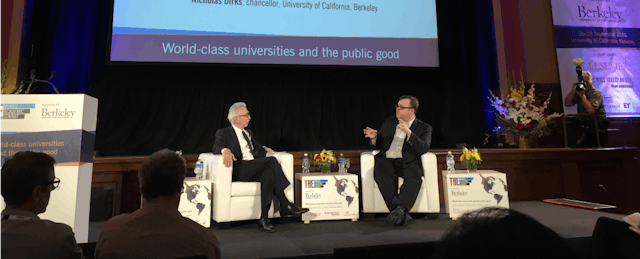Contrasts between rich and poor are profound in Silicon Valley, where a wealthy tech elite continues to drive up the cost of living, making it unaffordable for even middle class residents. Where else do you see homeless people camped out in the shadow of private buses shuttling employees to their jobs at campuses equipped with Michelin-caliber cafeterias, volleyball courts and laundry services?
At the Times Higher Education World Academic Summit this week, held at the University of California, Berkeley, hundreds of university presidents, provosts and chancellors confronted their roles in resolving age-old tensions between public services and private wealth. They addressed questions like, “How much should public universities let companies fund research?” and “How can higher-ed institutions broaden access to education without diminishing the quality of the learning experience for students?”
Robert Reich, chancellor’s professor of public policy at UC Berkeley and secretary of labor during the Clinton administration, summed up the challenge at hand for U.S. universities in his keynote address: “[The U.S. is] leading the world right now in inequality, in terms of advanced economies. We are leading the world in terms of inequality in terms of access to higher education,” he said. “They are interconnected.”
Universities as connectors
One way for universities to tackle growing socioeconomic inequalities is to think about connections—between each other, with governments and with industry. Reid Hoffman, co-founder of LinkedIn and venture capitalist, challenged universities to ditch the notion of higher education as an ivory tower where the pursuit of knowledge is protected and free from contamination by outside interests.
Labeled by The New Yorker last year as “the network man,” Hoffman has spent much of his adult life thinking about the connections between people. As a philosophy graduate student at Oxford, he was interested in “how humanity evolves at scale.”
Hoffman challenged university leaders to think of the connections they can help their students foster. “You have to think about how you’re putting students in a network,” he said. Faculty and educators should ask: “Does that network enable economic opportunities? Does it enable future learning opportunities? Does that network enable the kind of civil citizen that you want to create, which is part of education?”
It’s a fitting message from the man who started the world’s largest social media network for professionals. Last week LinkedIn launched a new platform to connect professionals to Lynda.com courses that are relevant to their careers. Hoffman also touted a new initiative, LinkedIn Cities, that will attempt to use the company’s data to show what skills are in high demand in specific locations. Universities could use the “skill index of an entire city” to help match students to local career opportunities.
Underlying Hoffman’s speech was an unwavering belief that networks are mutually beneficial. Alumni associations, for instance, should be more than a means to endowment funds—they should help alums connect to lifelong learning opportunities, he said.
He also implored university leaders to help students develop “network literacy” skills—proficiency at interacting in online environments to identify and connect sources of information. “To resolve truth is more important than memorization,” he said, emphasizing that knowing how and where to find information is just as or more important than memorizing it.
Helping students see connections between what they learn is also the job of universities, Hoffman said. “It’s not, we’ll teach you some math; we’ll teach you about reading and writing; we’ll teach you some analysis, and then it’s off to the races.” But rather, “how do you formulate that network in a way [so that students can] have a transformative life?”


